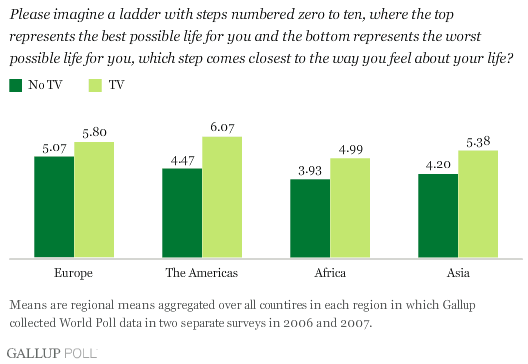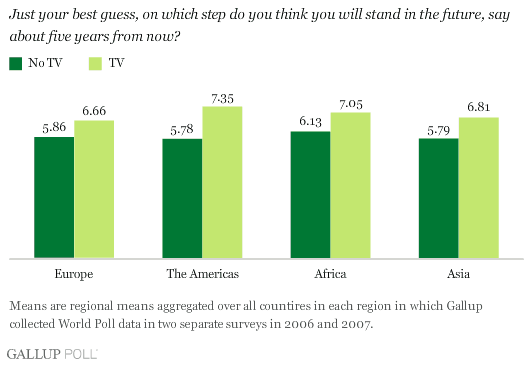WASHINGTON, D.C. -- In most countries the world over, ║┌┴¤═° data show that people who have televisions in their homes report greater well-being than do those who do not have televisions in their homes.

When asked where they currently stand on the Cantril Self-Anchoring Striving Scale on which "0" indicates the worst possible life and "10" indicates the best possible life, people with televisions in their homes report mean scores about one step higher than those without televisions report. Relative to people living in households without televisions, those with televisions also say they are more optimistic about their futures.

Specifically, when asked on which step they think they will stand five years from now, people with televisions report mean scores about one step higher than those without televisions report. Like the association between TV ownership and well-being, the association between TV ownership and optimism holds around most of the globe.
The beneficial effects of owning a TV hold up even after taking into account many of the desirable things that often go hand in hand with TV ownership, including wealth and access to electricity and running water. Even when comparing people with identical incomes, TV owners still enjoy higher levels of well-being and optimism. That is, in country after country, when equating TV owners and non-owners for income, TV owners still felt better about their current lives and their likely futures.
The strength of the TV ownership effect varies across countries. On average, the effects of owning a TV are stronger in poorer as opposed to wealthier countries. In fact, in many of the world's wealthiest countries, the TV ownership effect disappears altogether. This does not mean, however, that the TV ownership effect is strongest in the world's poorest countries. For both well-being and optimism, the effects of owning a TV are actually somewhat stronger in most Latin America countries than in most African countries. Infrastructure in these countries may best explain this difference. Access to electricity is more common in Latin American countries, with a regional median of 98% reporting that they have electricity in their homes, than it is in Africa, where the regional median is only 36%. Latin Americans may be poor enough to enjoy owning a TV and wealthy enough to be able to plug it in.
These complications aside, the TV ownership effect holds, not only at the global or regional level, but within most specific countries as well. With the interesting exception of the world's wealthiest countries, the TV ownership effect occurs in the large majority of countries worldwide. Together, these findings suggest that there is something about TV ownership per se that is associated with elevated well-being.
Survey Methods
Results are based on both telephone and face-to-face interviews with approximately 1,000 adults in most countries, aged 15 and older, conducted in 2006 and 2007. Because of the small number of respondents without TVs in most world regions, results were aggregated across regions. Confidence intervals for mean well-being and optimism vary from region to region based on sample sizes (of TV owners and non-owners) and standard deviations. For instance, in Europe there were only 810 respondents who did not have TVs in their households and 40,267 who did. For the European data, one can say with 95% confidence that the true population for well-being among those without TVs is between 4.88 and 5.26. For those with TVs the 95% confidence interval for well-being is much narrower -- between 5.78 and 5.82 -- because of the larger sample size. In addition to sampling error, question wording and practical difficulties in conducting surveys can introduce error or bias into the findings of public opinion polls.
